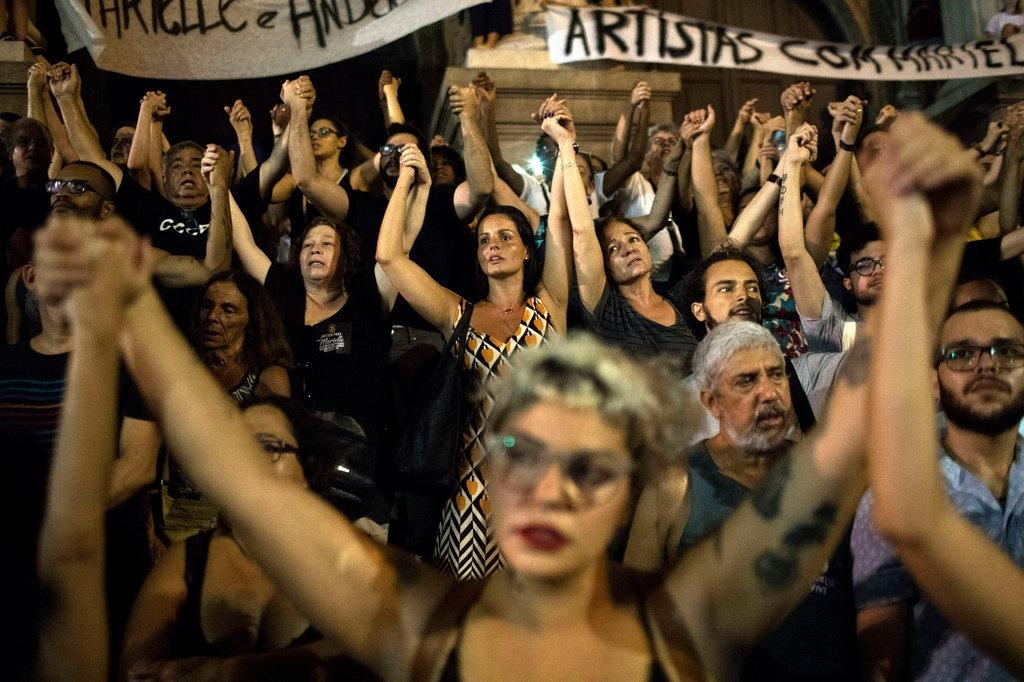
Protesting the slaying of Marielle Franco in Rio de Janeiro this month. Credit: Leo Correa/Associated Press
The New York Times
March 28, 2018
by Vanessa Barbara
Contributing Op-Ed Writer
SÃO PAULO, Brazil — It has been more than a month since Brazil’s Army took control of public security in the state of Rio de Janeiro, following a presidential decree to tackle crime. One of the most eloquent voices against that intervention had been Marielle Franco, a 38-year-old black bisexual woman who came from the Maré favela and was a member of Rio’s City Council.
On March 14, she was assassinated with four shots in the head after attending an event with other black young women in downtown Rio de Janeiro.
Ms. Franco was elected in 2016 and was the only black female representative on Rio’s 51-seat City Council. She was an outspoken defender of human rights, a feminist, a mother and a member of the Socialism and Liberty Party, and she had just been named rapporteur of a legislative commission that would monitor the military intervention.
“Who watches the watchers, right?” she asked in an interview last month. “Who should be accountable?” This wasn’t a rhetorical question; it was an urgent issue. Last January in Rio de Janeiro, at least 154 people were killed by the police; six police officers were murdered while on duty. Most of those people — the civilians and the police officers — were black and came from Rio’s poorest neighborhoods.
There’s a worry those numbers will rise with the military in charge. The top commander of Brazil’s Army, Gen. Eduardo Villas Bôas, recently said that his troops needed “guarantees to act without the risk of a new Truth Commission in the future,” a reference to the investigation into the abuses under the military dictatorship that lasted from 1964 to 1985. The commander has also expressed interest in getting “collective warrants” that would be issued for a broad area — for example, an entire favela — rather than a specific address.
Marielle Franco advocated for all of the victims in this “war on drugs.” While working on the Rio City Council’s Human Rights Commission, she’d helped dozens of families of officers killed on duty. In seven years, she said, she’d never visited a family who lived “from Tijuca to downtown,” meaning that most police officers reside in the poorest outskirts of Rio. “And they are generally black,” she said.
But she was also a fearless critic of state violence. She had worked as an aide for a parliamentary commission that investigated the involvement of the police and politicians in militias. A few days before she was murdered, she accused the 41st Military Police, the city’s deadliest unit, of terrorizing and harassing the residents of the Acari favela.
On the eve of the murder, she mourned the death of Matheus Melo, a 23-year-old who was shot while leaving church. “Another homicide of a young man that might be attributed to the police,” she wrote on Twitter. “How many more people need to die before this war ends?”
The identity and motive of Ms. Franco’s killers remain unknown, but it’s clear that the crime was premeditated: The assassins waited for her to leave the event and then followed her in two cars for a few miles. Then they engaged in a carefully targeted shooting and quickly left the scene without taking anything. According to investigators, the bullets came from police ammunition stocks. (The public security minister, Raul Jungmann, said he believed that they had been stolen from a post office.)
Brazil is one of the deadliest countries for human rights defenders in the world, alongside Colombia, Mexico and the Philippines. According to a report issued by Front Line Defenders, 67 activists were killed in Brazil last year. Of all the cases tracked by Front Line Defenders, only 12 percent resulted in the arrest of suspects. This seems to prove the sinister efficacy of the killings.
Even when the murders of Brazilian human rights defenders do receive coverage in the news media, people here frequently create other narratives to explain the murders: The person was killed by a lover, or by drug traffickers or by the mob, or committed suicide. And worse: the person might have deserved it.
It’s happening now with Ms. Franco. Soon after her killing, fake news began to circulate on social media. Some items said she was married to a drug trafficker, others that she was a member of a criminal organization. Some articles said she had smoked pot. Some articles claimed that she had a baby at 16. What a crime! (The truth: She had a baby at 19, a girl named Luyara. I cannot image how this is relevant to her assassination.)
A few weeks on, the narrative around Ms. Franco’s death is changing once again. Television newscasts play up the melodrama, focusing on the human tragedy; we can never get enough close-up shots of family members crying. Then they use this weeping momentum to put everything under the broader umbrella of Rio’s “violence” so that they can conclude by happily announcing that the federal government will liberate a couple of extra hundred million reals for the military intervention in Rio de Janeiro. Problem solved.
This is exactly the opposite of what Marielle Franco stood for.
She spent her days fighting inequality and injustice — not against an abstract notion of “violence.” So there’s no point in bringing more terror and repression to favelas, killing more of the same people (black, young and poor). Diverting resources from areas such as health and education to fund more bullets and tanks will only aggravate the violence. For that matter, Ms. Franco had advocated a new drug policy that didn’t involve armed incursions into communities. She also supported more diversity in political representation, encouraging the participation and candidacy of women and L.G.B.T. and indigenous people. Her way was the democratic way — not the authoritarian way of military rule.
She saw herself and other women as a “real threat to the status quo,” as she wrote last year in a newspaper article. In her opinion, the government wanted to constrain democracy in Brazil. “But we, black women from the poor neighborhoods, are going to affront this authoritarian nonsense,” she said.
Her last words caught on tape were addressed to a crowd of young black women: “Let’s go together and occupy everything.”
Vanessa Barbara, a contributing opinion writer, is the editor of the literary website A Hortaliça, and the author of two novels and two nonfiction books in Portuguese.
A version of this article appears in print on March 29, 2018, on Page A8 of the National edition with the headline: Don’t turn an activist’s killing into melodrama.

